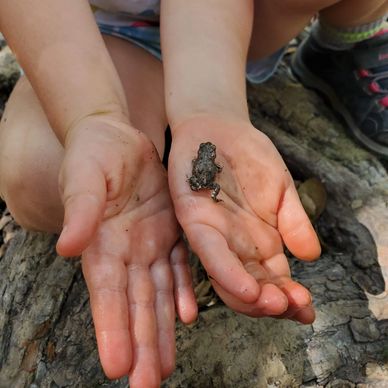Our Philosophy
What Do We Value?
Whole-Child Learning
What Do We Value?

Our approach emphasizes the value of holistic, play-based, and emergent learning within a natural environment. This not only provides the child with a deep sense of self but an understanding of and connection to the earth. The local ecosystem is our classroom. Aside from being play-based, we are nature-based, place-based, and research -based.
True Play
Whole-Child Learning
What Do We Value?

Our philosophy is influenced by the work of Dr. Peter Gray. The foundation for the truest, deepest learning occurs through self-chosen play. The criteria for such play is that it is...
1. Self-chosen and self-directed
2. Motivated by means more than ends
3. Guided by players' rules
4. Includes a strong element of imagination
5. Conducted in an alert, active, but relatively non-stressed frame of mind.
This does not mean adults don't introduce games, prompt discussions, or invite children to explore an interesting discovery, but that we allow children to take the lead. Teachers observe, guide, and provide as necessary.
Whole-Child Learning
Whole-Child Learning
Whole-Child Learning

The forest school method differs from traditional preschool in many ways including the way we approach learning. Our goals are not hyper-focused on school readiness nor academic achievement, but "life-readiness" and a love for learning. We believe in nourishing all aspects of development including relationship skills, self-awareness, emotional intelligence, critical thinking skills, social activism, in addition to the basic building blocks of literacy, math, music, physical development and self-expression.
Emergent Curriculum
Building Relationships
Whole-Child Learning

The curriculum at Foothills Forest School emerges from the interests and skills of the children as well as what emerges within our natural environment. The children learn through play, inquiry, exploration, discussion, and reflection. Throughout our sessions, the teachers will document the learning experiences of both the individual child and group at large. We believe the most significant learning experiences are the direct result of a deep-seated curiosity coming to fruition. Games, stories, art projects, science investigations, and more will stem from what the children are curious about. Our keen observations will aid us in relationship building, curriculum planning, and developmental assessments.
Building Relationships
Building Relationships
Building Relationships

Foothills Forest School teachers want to truly get to know each child and the wonderfully unique family from which they come. Relationships are the foundation of human life. Relationships are the foundation of early childhood. Relationships are the foundation of Earth and its ecosystems. Relationships build trust and understanding. Foothills Forest School believes in forging deep connections with ourselves, our peers, our families, and nature. Interconnectedness allows for a rich life abundant with meaningful moments.
Risk Taking
Building Relationships
Building Relationships

Natural spaces are full of risks as well as endless rewards. We trust that children can think critically, make decisions, and take risks. Examples of these physical risks can include jumping from a small boulder, balancing on a log, or running downhill. Other risks include tool use like cooking over a small fire, whittling with a knife, or using a rubber mallet. We believe that children can build resilience and self-confidence through appropriate risk-taking. In order to maintain children's safety, natural spaces and activities are always assessed for risks, hazards, and benefits.
A great resource for supporting risky play is Jarrod Green's book, "I'm OK: Building Resilience through Physical Play"
Nature Connection
Anti-Bias Perspectives
Anti-Bias Perspectives

At Foothills Forest school, it is understood that nature connection is at the forefront of what we do. Children develop a relationship with nature and our specific natural space. The earth provides all that we need to thrive developmentally. The children's days are filled with adventures that stimulate them physically, mentally, sensorially, and emotionally. Communication skills, questions, predictions, and observations are aplenty as we explore the oak woodlands of the East Bay.
Sandstone wind caves will harbor the secrets of a 4 year old's whispers. Live oak branches will become shelters. Red-shouldered hawks will nest above our watchful eyes. Western fence lizards will run from chubby, blackberry-stained fingers. It is through this deep connection with nature that the children will thrive, and so will our planet.
Anti-Bias Perspectives
Anti-Bias Perspectives
Anti-Bias Perspectives

Encouraging social justice and activism is a part of our philosophy at Foothills Forest School. Through conversation, stories, and activities, this approach aims to actively challenge bias, stereotypes, and discrimination. We aim to understand differences, value them, and promote inclusivity. We help children to become allies of all people, especially those who have been marginalized. As we are a land-based program, we aim to be strong allies of Indigenous peoples, learn about and honor their history, culture, and rights to their sacred places, especially the Ohlone and Bay Miwok.
Teachers are trained on how to approach these topics in an age-appropriate yet relevant and child-led way. For example, if a child is heard during play saying, "Everyone lives with their mom and dad," we may bring out books that display different family structures, encourage families to bring in family photos, or do a group graph during morning meeting "Who Lives With Me?" If a child picks up an acorn and asks, "Can we eat these?" this presents an opportunity for discussing Indigenous people of California and the importance of acorns in their lives.
This website uses cookies.
We use cookies to analyze website traffic and optimize your website experience. By accepting our use of cookies, your data will be aggregated with all other user data.
